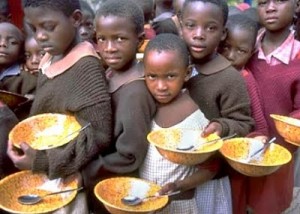Food security is a topic that economists, agronomists and politicians are always concerned about. Since the 1800’s, some economists predicted that we were going to face serious scarcities (Malthus’s theory) causing famines and deaths. Although the theory turned out to be wrong, nowadays it is still important to take seriously Malthus’s prediction since we can learn from it if we interpret it with a new lens. The way we produce our food is fragile and does not have a safety net. It faces three major challenges.
1)Water:
Agriculture accounts for three quarters of all freshwater use. Even assuming irrigated agriculture is made as efficient as possible humanity will still need at least 17% more fresh water to meet all of its food needs that are currently available. According to the World Water Organization:
The world’s water consumption rate is doubling every 20 years, outpacing by two times the rate of population growth. With persistent regional droughts, shifts of the growing population to urban coastal cities, and the water needed for industrial growth, it is projected that by the year 2025 water demand will exceed supply by 56%.
Those are frightening statistics. Without evening taking into consideration the problems that climate change will bring, the population increase will cause more water demand to increase radically. The only problem is that unlike food, water cannot be produced or substituted easily. As long as we don’t become more responsible water consumers, the water problem won’t be solved. The average American individual uses 100 to 176 gallons of water per day; in contrast, the average African family uses 5 gallons of water per day. And as long as we don’t solve the water problem, food security will not be obtained for the whole world. And as history has proven, it will be those in the most desperate situations that will suffer the consequences of scarcity and famines.
2) Rising oil prices:
Our food system is dependent on oil on every stage of the production. We produce our grains and our vegetables using fertilizers and pesticides that derive from oil. Farmers across the world (most importantly in the developed world) have become addicted to fertilizers and pesticides, thus oil. Once the food is grown, the processing and packaging also requires large amounts of energy. We use plastic to package and conserve most of our food. Transportation is dependent on oil. The rising of oil prices will shift food economics. The economic benefits that large agribusiness bring can be challenged by the oil prices.
3) Climate change:
Last but not least, climate change seems to be the most obvious threat to agriculture. It will significantly change weather patterns, temperatures, and change water cycles. This will cause major changes in the agricultural production. Some places will end up becoming more fertile, other less. But the important question is how will these transitions take place? There will be unpredicted migrations, shifts in production, and shift in prices. The agricultural transition caused by climate change will undoubtedly bring more insecurity to the food production system.
Maybe Malthus was right predicting the scarcity of food. But food scarcity won’t be the consequence of scarce land, population size, or low productivity. Our current food  system is a really fragile system because it is dependent on the oil price markets, on the use of scarce resources facing increasing demand (such as oil and water). And it is a system threatened by changes caused by the increase in weather temperatures.
system is a really fragile system because it is dependent on the oil price markets, on the use of scarce resources facing increasing demand (such as oil and water). And it is a system threatened by changes caused by the increase in weather temperatures.
Food should not be treated as a commodity since it is a basic necessity for life. As citizens of the world, we need to find the ways to improve our food system. We have to decrease our dependence of oil (having fresher and more local food, as well as organic), consume water responsibly and support those affected by the impacts of climate change.
Julia Naime (@julianasah) is a research intern at the SISGI Group. She is a senior at New York University majoring in Economics. During her internship, she is researching rural and international development and environmental policies. To learn more about the SISGI Group, please visit www.sisgigroup.org.

